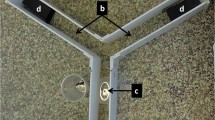Abstract
The social environment during development can affect learning; for example, raising an obligate social mammal in isolation can hinder their learning ability. However, we know little about how the social environment impacts learning in less-studied, facultatively social taxa, like family-living lizards. We reared tree skinks (Egernia striolata) in two treatments, either with a conspecific or in isolation. We used three tasks to quantify skink learning ability (motor, discrimination, and reversal). Skinks performed these tasks under two learning treatments: either after demonstration (social learning) or without social information (individual learning). We did not find any evidence that tree skinks used social information. The majority of skinks learnt our motor (91%) and discrimination tasks (100%), and a third learnt our reversal task (34%). Contrary to our predictions, and the majority of previous literature, we detected no negative effect of rearing treatment on learning in any task. Our surprising findings are likely due to this skink’s variable social system, and we suggest that birds and mammals with facultative sociality may not be affected by isolation rearing in the same way as taxa with obligate sociality.
Significance statement
Survival can be impacted by an animal’s ability to learn, but many factors can influence this ability (i.e., age, sex, stress, and developmental environment). In this study, we examined how social environment across ontogeny impacts the learning ability of a facultatively family-living animal, the tree skink. Traditionally, the relationship between social environment and learning has been examined in obligate social species. But, examining this relationship in species across all social systems aids in our understanding of the evolution of sociality, and the consequences and limitations of each social system. We found the social environment tree skinks were raised in did not affect their social or individual learning abilities across three foraging tasks. Our findings provide an initial examination of how social environment impacts learning in a facultatively social species.

Similar content being viewed by others
References
Apfelbeck B, Raess M (2008) Behavioural and hormonal effects of social isolation and neophobia in a gregarious bird species, the European starling (Sturnus vulgaris). Anim Behav 54:435–441
Bates D, Mächler M, Bolker B, Walker S (2015) Fitting linear mixed-effects models using lme4. J Stat Softw 67:1–48
Bonnett MP (1999) The ecology, behaviour and genetic relationships of a population of Egernia striolata. Honours thesis, Flinders University
Boogert NJ, Zimmer C, Spencer KA (2013) Pre- and post-natal stress have opposing effects on social information use. Biol Lett 9(2):20121088. https://doi.org/10.1098/rsbl.2012.1088
Bull CM, Griffin C, Bonnett M, Gardner MG, Cooper SJB (2001) Discrimination between related and unrelated individuals in the Australian lizard Egernia striolata. Behav Ecol Sociobiol 50(2):173–179. https://doi.org/10.1007/s002650100348
Bustard HR (1970) A population study of the scincid lizard Egernia striolata in northern New South Wales. KNAW 73:186
Cacioppo JT, Hawkley LC (2009) Perceived social isolation and cognition. Trends Cogn Sci 13(10):447–454. https://doi.org/10.1016/j.tics.2009.06.005
Carazo P, Noble DWA, Chandrasoma D, Whiting MJ (2014) Sex and boldness explain individual differences in spatial learning in a lizard. Proc R Soc B 281(1782):20133275. https://doi.org/10.1098/rspb.2013.3275
Chapple DG (2003) Ecology, life-history, and behavior in the australian scincid genus Egernia, with comments on the evolution of complex sociality in lizards. Herpetol Monogr 17(1):145–180
Clark BF, Amiel JJ, Shine R, Noble DWA, Whiting MJ (2013) Colour discrimination an associative learning in hatchling lizards incubated at ‘hot’ and ‘cold’ temperatures. Behav Ecol Sociobiol 68:239–247
Crino OL, Driscoll SC, Ton R, Breuner CW (2014) Corticosterone exposure during development improves performance on a novel foraging task in zebra finches. Anim Behav 91:27–32. https://doi.org/10.1016/j.anbehav.2014.02.017
Cunningham RB, Lindenmayer DB, Crane M, Michael D, MacGregor C (2007) Reptile and arboreal marsupial response to replanted vegetation in agricultural landscapes. Ecol Appl 17:609–619
Dayananda B, Webb JK (2017) Incubation under climate warming affects learning ability and survival in hatchling lizards. Biol Lett 13:2017002
Duckett PE, Morgan MH, Stow AJ (2012) Tree-dwelling populations of the skink Egernia striolata aggregate in groups of close kin. Copeia 2012(1):130–134. https://doi.org/10.1643/CE-10-183
Dukas R (2004) Evolutionary biology of animal cognition. Annu Rev Ecol Evol Syst 35(1):347–374. https://doi.org/10.1146/annurev.ecolsys.35.112202.130152
Einon D (1980) Spatial memory and response strategies in rats: age, sex and rearing difference in performance. Q J Exp Psychol 32(3):473–489. https://doi.org/10.1080/14640748008401840
Fox J (2003) Effect displays in R for generalised linear models. J Stat Softw 8:1–9
Fox J, Hong J (2009) Effect displays in R for multinomial and proportional-odds logit models: extensions to the effects package. J Stat Softw 31:1–24
Frisone DF, Frye CA, Zimmerberg B (2002) Social isolation stress during the third week of life has age-dependent effects on spatial learning in rats. Behav Brain Res 128(2):153–160. https://doi.org/10.1016/S0166-4328(01)00315-1
Gerstner K, Moreno-Mateos D, Gurevitch J, Beckmann M, Kambach S, Jones HP, Seppelt R (2017) Will your paper be used in a meta-analysis? Make the reach of your research broader and longer lasting. Methods Ecol Evol 10:236–238
Goerlich VC, Nätt D, Elfwing M, Macdonald B, Jensen P (2012) Transgenerational effects of early experience on behavioral, hormonal and gene expression responses to acute stress in the precocial chicken. Horm Behav 61(5):711–718. https://doi.org/10.1016/j.yhbeh.2012.03.006
Greenough WT, Madden TC, Fleischmann TB (1972) Effects of isolation, daily handling, and enriched rearing on maze learning. Psychon Sci 27(5):279–280. https://doi.org/10.3758/BF03328961
Harlow HF, Dodsworth RO, Harlow MK (1965) Total social isolation in monkeys. Proc Natl Acad Sci USA 54(1):90–97. https://doi.org/10.1073/pnas.54.1.90
Hoppitt W, Laland KN (2013) Social learning: an introduction to mechanisms, methods, and models. Princeton University Press, Princeton. https://doi.org/10.1515/9781400846504
Juraska JM, Henderson C, Müller J (1984) Differential rearing experience, gender, and radial maze performance. Dev Psychobiol 17(3):209–215. https://doi.org/10.1002/dev.420170302
Kaufman AB, Rosenthal R (2009) Can you believe my eyes? The importance of interobserver reliability statistics in observations of animal behaviour. Anim Behav 78(6):1487–1491. https://doi.org/10.1016/j.anbehav.2009.09.014
Kendal R, Hopper LM, Whiten A, Brosnan SF, Lambeth SP, Schapiro SJ, Hoppitt W (2014) Chimpanzees copy dominant and knowledgeable individuals: implications for cultural diversity. Evol Hum Behav 36:65–72
Laland KN (2004) Social learning strategies. Learn Behav 32(1):4–14. https://doi.org/10.3758/BF03196002
Langkilde T, O’Connor D, Shine R (2007) Benefits of parental care: do juvenile lizards obtain better-quality habitat by remaining with their parents? Austral Ecol 32(8):950–954. https://doi.org/10.1111/j.1442-9993.2007.01783.x
Lanham EJ, Bull CM (2000) Maternal care and infanticide in the Australian skink, Egernia stokesii. Herpetol Rev 31:151–152
Leris I, Reader SM (2016) Age and early social environment influence guppy social learning propensities. Anim Behav 120:11–19. https://doi.org/10.1016/j.anbehav.2016.07.012
Michael DR, Cunningham RB (2010) The social elite: habitat heterogeneity, complexity and quality in granite inselbergs influence patterns of aggregation in Egernia striolata (Lygosominae: Scincidae). Austral Ecol 35(8):862–870. https://doi.org/10.1111/j.1442-9993.2009.02092.x
Morgan MJ, Einon DF, Nicholas D (1975) The effects of isolation rearing on behavioural inhibition in the rat. Q J Exp Psychol 27(4):615–634. https://doi.org/10.1080/14640747508400524
Nakagawa S, Cuthill IC (2007) Effect size, confidence interval and statistical significance: a practical guide for biologists. Biol Rev 82(4):591–605. https://doi.org/10.1111/j.1469-185X.2007.00027.x
Noble DWA, Carazo P, Whiting MJ (2012) Learning outdoors: male lizards show flexible spatial learning under semi-natural conditions. Biol Lett 8(6):946–948. https://doi.org/10.1098/rsbl.2012.0813
Noble DWA, Byrne RW, Whiting MJ (2014) Age-dependent social learning in a lizard. Biol Lett 10(7):20140430. https://doi.org/10.1098/rsbl.2014.0430
O’Connor DE, Shine R (2004) Parental care protects against infanticide in the lizard Egernia saxatilis (Scincidae). Anim Behav 68(6):1361–1369. https://doi.org/10.1016/j.anbehav.2004.02.014
Post MJ (2000) The captive husbandry and reproduction of the Hosmer’s skink Egernia hosmeri. Herpetofauna 30:2–6
R Core Team (2016) R: a language and environment for statistical computing. R Foundation for Statistical Computing, Vienna http://www.R-project.org
Riley JL, Noble DWA, Byrne RW, Whiting MJ (2016) Does social environment influence learning ability in a family-living lizard? Anim Cogn 20:449–458
Riley JL, Noble DWA, Byrne RW, Whiting MJ (2017) Early social environment influences the behaviour of a family-living lizard. R Soc Open Sci 4(5):161082. https://doi.org/10.1098/rsos.161082
Schausberger P, Gratzer M, Strodl MA (2017) Early social isolation impairs development, mate choice and grouping behaviour of predatory mites. Anim Behav 127:15–21. https://doi.org/10.1016/j.anbehav.2017.02.024
Schradin C, Lindholm AK, Johannesen J, Schoepf I, Yuen CH, König B, Pillay N (2011) Social flexibility and social evolution in mammals: a case study of the African striped mouse (Rhabdomys pumilio). Mol Ecol 21:541–553
Shettleworth SJ (2010) Cognition, evolution, and behavior. Oxford University Press, New York
Sih A, Del Giudice M (2012) Linking behavioural sydnromes and cognition: a behavioural ecology perspective. Philos Trans R Soc B 367(1603):2762–2772. https://doi.org/10.1098/rstb.2012.0216
Taborsky B, Oliveira RF (2012) Social competence: an evolutionary approach. Trends Ecol Evol 27(12):679–688
Takahashi K, Masuda R, Yamashita Y (2014) Development of observational learning during school formation in jack mackerel Trachurus japonicus juveniles. Behav Process 103:52–57. https://doi.org/10.1016/j.beproc.2013.10.012
Thornton A, Lukas D (2012) Individual variation in cognitive performance: developmental and evolutionary perspectives. Philos Trans R Soc B 367(1603):2773–2783. https://doi.org/10.1098/rstb.2012.0214
Trompf L, Brown C (2014) Personality affects learning and trade-offs between private and social information in guppies, Poecilia reticulata. Anim Behav 88:99–106. https://doi.org/10.1016/j.anbehav.2013.11.022
Ward AJW, Webster M (2016) Sociality: the behaviour of group-living animals. Springer International Publishing, Cham
While GM, Wapstra E (2008) Are there benefits to being born asynchronously: an experimental test in a social lizard. Behav Ecol 19(1):208–216. https://doi.org/10.1093/beheco/arm124
Whiting MJ, While GM (2017) Sociality in lizards. In: Rubenstein DR, Abbot P (eds) Comparative social evolution. Cambridge University Press, Cambridge, pp 390–426. https://doi.org/10.1017/9781107338319.014
Wongwitdecha N, Marsden CA (1996) Effects of social isolation rearing on learning in the Morris water maze. Brain Res 715(1-2):119–124. https://doi.org/10.1016/0006-8993(95)01578-7
Zuur AF, Ieno EN, Elphick CS (2009) A protocol for data exploration to avoid common statistical problems. Methods Ecol Evol 1:3–14
Acknowledgments
We thank Bram Smagala, Côme Guidou, and Sheila Attersley for field assistance, James Baxter-Gilbert for his assistance with laboratory assays, as well as all the Lizard Lab students that took care of skinks during their development and helped with this research. We also thank two anonymous referees for their helpful comments.
Funding
Financial support for this research was provided by the Australian Research Council (ARC DP130102998 grant to MJW and RWB), Natural Sciences and Engineering Research Council of Canada (scholarship to JLR), the Australasian Society for the Study of Animal Behavior, the Australian Museum, and Macquarie University (scholarship to JLR). DWAN was supported by an ARC Discovery Early Career Research Award (DE150101774), and a University of New South Wales Vice Chancellors Fellowship.
Author information
Authors and Affiliations
Corresponding author
Ethics declarations
Ethical approval
Experimental protocols were approved by the Macquarie University Animal Ethics Committee (ARA no. 2013/039). Our research was approved by the New South Wales National Parks and Wildlife Service, Office of Environment and Heritage (License no. SL101264).
Conflict of interest
The authors declare that they have no conflict of interest.
Additional information
Communicated by S. J. Downes
Electronic supplementary material
ESM 1
(DOCX 308 kb).
(AVI 29441 kb)
Rights and permissions
About this article
Cite this article
Riley, J.L., Küchler, A., Damasio, T. et al. Learning ability is unaffected by isolation rearing in a family-living lizard. Behav Ecol Sociobiol 72, 20 (2018). https://doi.org/10.1007/s00265-017-2435-9
Received:
Revised:
Accepted:
Published:
DOI: https://doi.org/10.1007/s00265-017-2435-9




